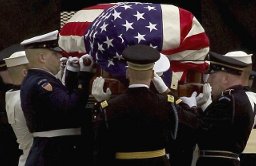 One in six service members is now taking at least one psychiatric drug, according to the Navy Times, with many soldiers taking "drug cocktail" combinations. Soldiers and military health care providers told the Military Times that psychiatric drugs are "being prescribed, consumed, shared and traded in combat zones.
One in six service members is now taking at least one psychiatric drug, according to the Navy Times, with many soldiers taking "drug cocktail" combinations. Soldiers and military health care providers told the Military Times that psychiatric drugs are "being prescribed, consumed, shared and traded in combat zones.
The Navy Times reporters Andrew Tilghman and Brendan McGarry also noted that there has been a large increase in military suicides. From 2001 to 2009, the Army's official suicide rate increased from 9 per 100,000 soldiers to 23 per 100,000. During that same period, the Marine Corps suicide rate increased from 16.7 per 100,000 soldiers to 24 per 100,000.
A Military Times investigation of records obtained from the Defense Logistics Agency (DLA) revealed that the DLA spent $1.1 billion on psychiatric and pain medications from 2001 to 2009, and that there was a 76 percent increase in psychiatric drugs. DLA records show:
- Antipsychotic drugs spiked most dramatically -- orders jumping by more than 200 percent.
- Orders for anti-anxiety drugs and sleeping pills such as Valium and Ambien increased 170 percent.
- Orders for antiepileptic drugs (also known as anticonvulsants) such as Depakote, routinely used as psychiatric medications, increased 70 percent.
- 40 percent increase in antidepressants.
Investigators found that antipsychotic and antiepileptic drugs, approved for bipolar disorder and schizophrenia, are now commonly used to treat post-traumatic stress disorder (PTSD) symptoms such as nightmares, nervousness and anger outbursts. The use of antipsychotic drugs for non-psychotic conditions such as PTSD is called "off-label" prescribing. The general public is also subject to off-label prescribing, which is considered legal.
In February 2010, Brig. Gen. Loree Sutton, the Army's highest-ranking psychiatrist, reported to Congress that 17 percent of the active-duty force and as much as 6 percent of deployed troops are on antidepressants.
Just how insane is it to prescribe psychiatric drugs to deployed troops? The Navy Times tells us about Spc. Mike Kern who enlisted in 2006 and spent a year deployed in 2008 with the 4th Infantry Division as an armor crewman, running patrols out of southwest Baghdad. Suffering from nervousness, sleep problems and depression, Kern was given the antidepressant Paxil. A few days later, while patrolling the streets in the gunner's turret of a Humvee, Kern said he began having serious thoughts of suicide for the first time in his life. Kern said:
"I had three weapons: a pistol, my rifle and a machine gun. I started to think, 'I could just do this and then it's over.' That's where my brain was: 'I can just put this gun right here and pull the trigger and I'm done. All my problems will be gone.'"
The Food and Drug Administration now requires that antidepressants must be labeled with a warning about increased risk of "suicidality" (which includes suicidal thoughts as well as attempts). This "black-box" warning is a result of research concluding that antidepressants double the risk of suicidality in depressed children, teenagers, and young adults as compared to equally depressed young people who are not taking antidepressants. Given meta-analyses (that I cite in Surviving America's Depression Epidemic) which show that antidepressants are often no more effective than placebos, the potential risks of giving these drugs to soldiers in a war zone clearly outweigh any potential benefits.
Many of these psychiatric drugs prescribed to service members can also impair motor skills, reduce reaction times, and generally make one more sluggish -- or what soldiers call "stupid." So in addition to antidepressants potentially resulting in increased suicidality, other psychiatric drugs can make deployed soldiers feel less capable of protecting themselves and their buddies. While being slow or "stupid" is not going to cost a general or politician his or her life, it can cost soldiers the vigilance necessary to keep themselves and their fellow soldiers alive.
Related Articles:
Video Scenes From Prescription For Manslaughter
Episode 39: Like I was Just Left Holding a Gun
When Liberals and Conservatives are Two Sides of the Same Oppressive Coin
What's It Going to Take to Lock Up Drug Company Execs?
Psychiatry's 'Shock Doctrine': Are We Really Okay With Electroshocking Toddlers?
The Pharmaceutical Tragedy of Kurt Danysh
The gunman was described as a loner and was being treated by a psychiatrist for...
Antidepressants Produce Plenty of Side-Effects, But Don't Reduce Depression
